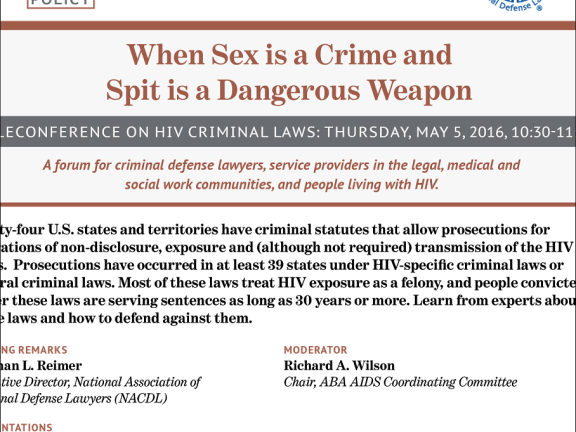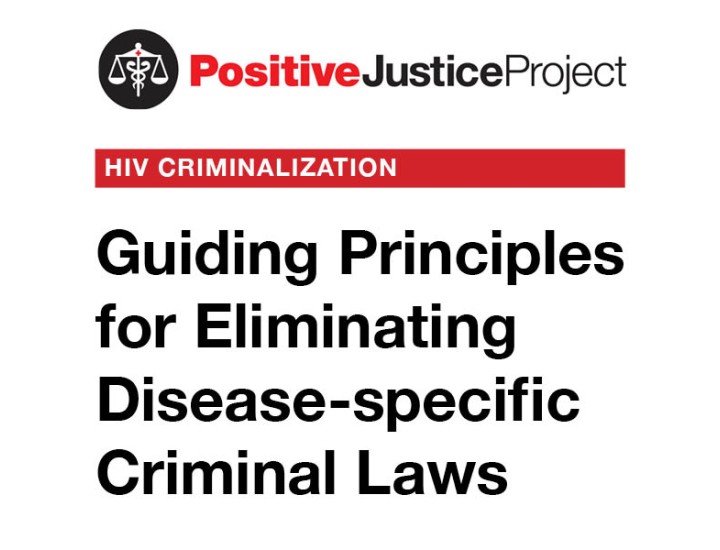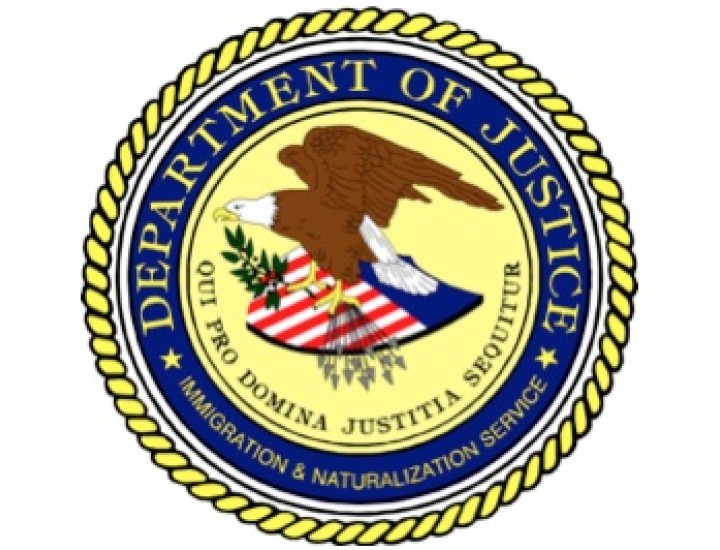Published May, 2016
When Sex Is a Crime and Spit Is a Dangerous Weapon: A Teleconference on HIV Criminal Laws, American Bar Association AIDS Coordinating Committee, The Center for HIV Law and Policy, and National Association of Criminal Defense Lawyers (2016)

WHEN SEX IS A CRIME AND SPIT IS A DANGEROUS WEAPON: A Teleconference on HIV Criminal Laws
Sponsoring organizations: The ABA AIDS Coordinating Committee, The Center for HIV Law and Policy, and The National Association of Criminal Defense Lawyers.
CHLP, The American Bar Association AIDS Coordinating Committee and the National Association of Criminal Defense Lawyers held an interactive teleconference on May 5, 2016 on HIV criminal law for criminal defense lawyers, service providers in the legal, medical and social work communities and people living with HIV. Presentations followed by An audience Q and A follows the two presentations. A full audio replay of the teleconference is available here:
Summary: Thirty-four U.S. states and territories have criminal statutes that allow prosecutions for allegations of non-disclosure, exposure and (although not required) transmission of the HIV virus. Prosecutions have occurred in at least 39 states under HIV-specific criminal laws or general criminal laws. Most of these laws treat HIV exposure as a felony, and people convicted under these laws are serving sentences as long as 30 years or more. Learn from experts about these laws and how to defend against them.
Opening Remarks: Norman L. Reimer, Executive Director of the National Association of Criminal Defense Lawyers (NACDL)
Moderator: Richard A. Wilson, Chair ABA AIDS Coordinating Committee.*
*NOTE: Michael L. Pates, the Director of the Center for Human Rights and AIDS Coordination Project at the ABA, spoke in place of Richard Wilson at the event.
Presentation One: Department of Justice Civil Rights Division’s Guide to Reform HIV-Specific Criminal Laws to Align with Scientifically-Supported Factors by Allison Nichol, CHLP Co-Executive Director.
In May 2013 the United States Department of Justice, Civil Rights Division (CRD) issued guidance on how to reform HIV-specific criminal laws to bring them into alignment with current science, from actual routes and risks of transmission to the transformation of HIV treatment and prevention with the development of highly effective antiretroviral therapy (ART).
Presentation Two
Defending Against HIV State Law Prosecutions by Mayo Schreiber, CHLP Deputy Director.
Two recent cases in which CHLP participated, one in Missouri and one in Ohio, will be discussed, along with the HIV criminal statutes in those states. These cases and statutes are illustrative of the fundamental injustice of the statutes as drafted and the punishments provided for violating them. Defense trial and sentencing strategy will be analyzed, including identification of experts and supporting resources, and current thinking on legal challenges to these laws.
A Q&A Session Will Follow.
______________________
NACDL is the preeminent organization in the United States advancing the mission of the nation’s criminal defense bar to ensure justice and due process for all and to advocate for rational and humane criminal justice policies. As executive director, Norman Reimer leads a professional staff based in Washington, D.C. serving NACDL’s approximately 9,000 direct members and 90 local, state and international affiliate organizations with up to 40,000 members.
The ABA AIDS Coordinating Committee stands as the core of the ABA’s response to the HIV/AIDS Pandemic developing HIV/AIDS-related policies and, upon their adoption, advancing those policies through ABA-sponsored programs and projects. Richard Wilson is a recognized family law expert, with particular expertise in same sex relationships, and is an adjunct lecturer at University of Michigan Law School.
The Center for HIV Law and Policy (CHLP) is a national legal resource and strategy center working to reduce the impact of HIV on marginalized communities, and a national leader on HIV criminal law reform and modernization at the federal and state level. CHLP provides case assistance to attorneys representing defendants charged with statutory violations of HIV transmission and exposure, and maintains an extensive collection of free, online materials to support legal advocacy across the country in its HIV Policy Resource Bank, including hundreds of materials on the criminal law treatment of HIV.
Allison Nichol, Co-Executive Director, CHLP, came to CHLP after twenty-one years with the Department of Justice (DOJ), where she was Deputy Chief, and then Chief, of the Disability Rights Section of the Civil Rights Division. At the DOJ she oversaw litigation, policy, regulatory and technical assistance development related to the Americans with Disabilities Act. She was a founder and long-time member of the Division’s GLBTQI Working Group and was a 2002 recipient of the James R. Douglas Award from DOJ Pride for her work on behalf of those with HIV. As the DOJ’s long-time expert on HIV law and policy, she represented the Department on the federal working groups the National Strategy on HIV/AIDS and the Intersection of HIV/AIDS, Violence against Women, and Girls and Gender-Related Health Disparities. She is the author of the U.S. Department of Justice Civil Rights Division Best Practices Guide to Reform HIV-Specific Criminal Laws to Align with Scientifically-Supported Factors and the co-author of Prevalence and Public Health Implications of State Laws that Criminalize Potential HIV Exposure in the United States.
Mayo Schreiber, Jr., Deputy Director, CHLP, is a federal criminal defense attorney with twenty-five years of experience in private practice. Previously he was a Pro Se Law Clerk at the United States Court of Appeals for the Second Circuit. He was also a Monitor to the Honorable William Wayne Justice, Chief Judge, United States District Court, Eastern District of Texas, in Ruiz v. McCotter, a case involving confinement conditions for all prisoners incarcerated by the state of Texas. He earned his A.B. degree with Honors from Oberlin College and his J.D. from Northeastern University School of Law.
Copyright Information: CHLP encourages the broad use and sharing of resources. Please credit CHLP when using these materials or their content. and do not alter, adapt or present as your work without prior permission from CHLP.
Legal Disclaimer: CHLP makes an effort to ensure legal information is correct and current, but the law is regularly changing, and the accuracy of the information provided cannot be guaranteed. The legal information in a given resource may not be applicable to all situations and is not—and should not be relied upon—as a substitute for legal advice.

